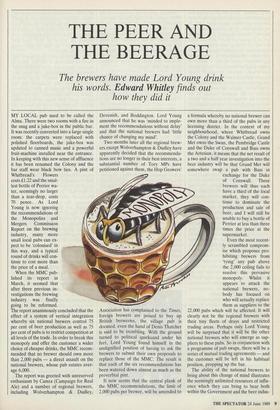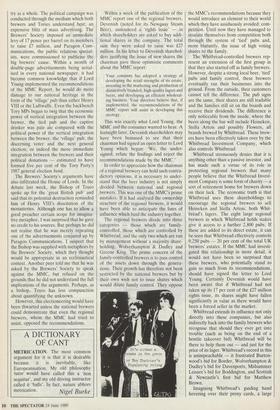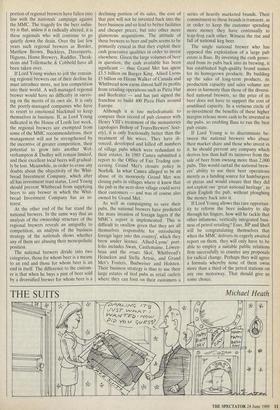THE PEER AND THE BEERAGE
The brewers have made Lord Young drink how they did it
MY LOCAL pub used to be called the Alma. There were two rooms with a fire in the snug and a juke-box in the public bar. It was recently converted into a large single room: the carpets were replaced with polished floorboards, the juke-box was updated to canned music and a powerful fruit-machine installed near the entrance. In keeping with this new sense of affluence it has been renamed the Colony and the bar staff wear black bow ties. A pint of Whitbread's Flowers costs £1.22 and the smal- lest bottle of Perrier wa- ter, seemingly no larger than a tear-drop, costs 70 pence. As Lord Young is now ignoring the recommendations of the Monopolies and Mergers Commission Report on the brewing industry, many more small local pubs• can ex- pect to be 'colonised' in this way, and a typical round of drinks will con- tinue to cost more than the price of a meal.
When the MMC pub- lished its report in March, it seemed that after three previous in- vestigations the brewing industry was finally going to be reformed. The report unanimously concluded that the effect of a system of vertical integration whereby six national brewers control 75 per cent of beer production as well as 75 per cent of pubs is to restrict competition at all levels of the trade. In order to break this monopoly and offer the customer a wider choice of cheaper drinks, the MMC recom- mended that no brewer should own more than 2,000 pubs — a direct assault on the national brewers, whose pub estates aver- age 6,000.
The report was greeted with unreserved enthusiasm by Camra (Campaign for Real Ale) and a number of regional brewers, including Wolverhampton & Dudley, Devenish, and Boddington. Lord Young announced that he was 'minded to imple- ment the recommendations without delay' and that the national brewers had 'little chance of changing my mind'.
Two months later all the regional brew- ers except Wolverhampton & Dudley have apparently decided that the recommenda- tions are no longer in their best interests, a substantial number of Tory MPs have petitioned against them, the Hop Growers' Association has complained to the Times, foreign brewers are poised to buy up British breweries, the village pub is doomed, even the hand of Denis Thatcher is said to be trembling. With the ground turned to political quicksand under his feet, Lord Young found himself in the undignified position of having to ask the brewers to submit their own proposals to replace those of the MMC. The result is that each of the six recommendations has been watered down almost as much as the proverbial pint.
It now seems that the central plank of the MMC recommendations, the limit of 2,000 pubs per brewer, will be amended to The ability of the national brewers to bring about this change of mind illustrates the seemingly unlimited resources of influ- ence which they can bring to bear both within the Government and the beer indus- try as a whole. The political campaign was conducted through the medium which both brewers and Tories understand best: an expensive blitz of mass advertising. The Brewers' Society imposed an immediate levy of 17 pence per barrel on its members to raise £7 million, and Paragon Com- munications, the public relations special- ists, were commissioned to publicise the big brewers' cause. Within a month of double-page advertisements being serial- ised in every national newspaper, it had become common knowledge that if Lord Young implemented the recommendations of the MMC Report, he would do more damage to our national heritage in the form of the 'village' pub than either Henry VIII or the Luftwaffe. Even the backbench Tory MPs began to twig that the economic power of vertical integration between the brewer, the tied pub and the captive drinker was pale ale compared with the political power of the vertical integration between the brewer, the 'village' pub, the discerning voter and the next general election; or indeed the more immediate integration between the brewers and their political donations — estimated to have formed five per cent of the Tory Party's 1987 general election fund.
The Brewers' Society's arguments have also infiltrated the House of Lords. In the debate last week, the Bishop of Truro spoke up for the 'great British pub' and said that its potential destruction reminded him of Henry VIII's dissolution of the monasteries. Although one has to allow a good preacher certain scope for imagina- tive metaphor, I was surprised that he gave no credit to his sources. But perhaps he did not realise that he was merely repeating one of the advertisements conjured up by Paragon Communications. I suspect that the Bishop was supplied with metaphors by the Brewers' Society, which they thought would be appropriate in an ecclesiastical context. Another peer told me that he was asked by the Brewers' Society to speak against the MMC, but refused on the grounds that he did not understand the full implications of the arguments. Perhaps, as a bishop, Truro has less compunction about quantifying the unknown.
However, this electioneering would have been thwarted unless the national brewers could demonstrate that even the regional brewers, whom the MMC had tried to assist, opposed the recommendations. Within a week of the publication of the MMC report one of the regional brewers, Devenish (noted for its Newquay Steam Beer), announced a 'rights issue' — in which shareholders are asked to buy addi- tional shares in the company. The total sum they were asked to raise was £27 million. In his letter to Devenish sharehol- ders justifying the issue of new shares the chairman gave these optimistic comments about the MMC report:
Your company has adopted a strategy of developing the retail strengths of its estate, investing in the marketing and production of distinctively branded, high-quality lagers and beers, and developing an efficient wholesal- ing business. Your directors believe that, if implemented, the recommendations of the MMC report will assist in developing this strategy.
This was exactly what Lord Young, the MMC and the consumer wanted to hear. A fortnight later, Devenish shareholders may have been bemused to see that their chairman had signed an open letter to Lord Young which began: 'We, the under- signed, refute the findings and reject the recommendations made by the MMC.'
In order to appreciate how the chairman of a regional brewery can hold such contra- dictory opinions, it is necessary to under- stand that the beer industry is not simply divided between national and regional brewers. This was one of the MMC's prime mistakes. If it had analysed the ownership structure of the regional brewers, it would have been able to anticipate the lines of influence which bind the industry together.
The regional brewers divide into three categories — those which are family- controlled, those which are controlled by Whitbread, and the only two which are run by management without a majority share- holding, Wolverhampton & Dudley and Greene King. The prime concern of the family-controlled brewers is to pass control of the assets down through the genera- tions. Their growth has therefore not been restricted by the national brewers but by their own wish not to issue shares which would dilute family control. They oppose the MMC's recommendations because they would introduce an element to their world which they have assiduously avoided: com- petition. Until now they have managed to insulate themselves from competition both through the system of 'tied' pubs and, more blatantly, the issue of high voting shares to the family.
The Whitbread-controlled brewers rep- resent an extension of the first group in that they also started off as family brewers. However, despite a strong local beer, 'tied' pubs and family control, these brewers eventually ran their businesses into the ground. From the outside, their customers cannot tell the difference. The pub signs are the same, their shares are still tradable and the families still sit on the boards and receive their dividends. The difference is only noticeable from the inside, where the beers along the bar will include Heineken, Stella Artois and possibly Flowers, all brands brewed by Whitbread. These brew- ers have been effectively taken over by the Whitbread Investment Company, which also controls Whitbread.
Whitbread strenuously denies that it is anything other than a passive investor, and has made such a virtue of its role in protecting regional brewers that many people believe that the Whitbread Invest- ment Company is some form of charity — a sort of retirement home for brewers down on their luck. The economic truth is that Whitbread uses these shareholdings to encourage the regional brewers to sell Heineken and Stella Artois, both Whit- bread's lagers. The eight large regional brewers in which Whitbread holds stakes give it access to a further 2,800 pubs. If these are added to its direct estate, it can be seen that Whitbread effectively controls 9,250 pubs — 20 per cent of the total UK brewers' estates. If the MMC had investi- gated this relationship in more detail, it would not have been so surprised that these brewers, who potentially stand to gain so much from its recommendations, should have signed the letter to Lord Young. Certainly Devenish would have been aware that if Whitbread had not taken up its 17 per cent of the £27 million rights issue, its shares might have fallen significantly in value as there would have been a forced seller in the market.
Whitbread extends its influence not only directly into these companies, but also indirectly back into the family brewers who recognise that should they ever get into trouble (such as being on the end of a hostile takeover bid) Whitbread will be there to help them out — and just for the price of its lager. Whitbread's record in this is unimpeachable — it frustrated Burton- wood's bid for Border, Wolverhampton & Dudley's bid for Davenports, Midsummer Leisure's bid for Boddington, and Scottish & Newcastle's first bid for Matthew Brown.
Imagining Whitbread's guiding hand hovering over their proxy cards, a large portion of regional brewers have fallen into line with the nationals' campaign against the MMC. The tragedy for the beer indus- try is that, unless it is radically altered, it is these regionals who will continue to go quietly down the drain. Over the last few years such regional brewers as Border, Matthew Brown, Buckleys, Davenports, Higsons, Home Brewery, Ruddles, Theak- stons and Tollemache & Cobbold have all been taken over.
If Lord Young wishes to jolt the remain- ing regional brewers out of their decline he must introduce more, not less competition into their world. A well-managed regional brewer would have no difficulty in surviv- ing on the merits of its own ale. It is only the poorly-managed companies who have to resort to emotional blackmail to keep themselves in business. If, as Lord Young indicated in the House of Lords last week, the regional brewers are exempted from some of the MMC recommendations, their management will not be strengthened by the incentive of greater competition, their potential to grow into another Wol- verhampton & Dudley will remain limited, and their excellent local beers will gradual- ly be lost. Meanwhile, in order to erase any doubts about the objectivity of the Whit- bread Investment Company, which after all has investment trust status, Lord Young should prevent Whitbread from supplying beers to any brewer in which the Whit- bread Investment Company has an in- terest.
At the other end of the bar stand the national brewers. In the same way that an analysis of the ownership structure of the regional brewers reveals an antipathy to competition, an analysis of the business strategy of the nationals shows whether any of them are abusing their monopolistic position. The national brewers divide into two categories, those for whom beer is a means to an end and those for whom beer is an end in itself. The difference to the custom- er is that when he buys a pint of beer sold by a diversified brewer for whom beer is a declining portion of its sales, the cost of that pint will not be invested back into the beer business and so lead to better facilities and cheaper prices, but into other more glamorous acquisitions. The attitude of these brewers to beer and pubs seems to be primarily cynical in that they exploit their cash generative qualities in order to invest elsewhere. Given the large volumes of beer in question, the cash available has been significant — thus Grand Met has spent £3.5 billion on Burger King, Allied Lyons £5 billion on Hiram Walker of Canada and Whitbread now earns almost half its profits from retailing operations such as Pizza Hut and Beefeater — and has just signed the franchise to build 400 Pizza Huts around Europe.
Although it is too melodramatic to compare their record of pub closures with Henry VIII's treatment of the monasteries (apologies Bishop of Truro/Brewers' Soci- ety), it is only fractionally better than the treatment of his wives. They have di- vorced, developed and killed off numbers of village pubs which were redundant to their estates. In 1985 Camra submitted a report to the Office of Fair Trading con- cerning Grand Met's closure policy in Norfolk. In what Camra alleged to be an abuse of its monopoly Grand Met was closing pubs in villages where it knew that the pub in the next-door village could serve their customers — and was of course also owned by Grand. Met.
As well as campaigning to save their pubs, the national brewers have predicted the mass invasion of foreign lagers if the MMC's report is implemented. This is difficult to swallow given that they are all themselves responsible for introducing foreign lager into this couhtrl, which they brew under licence. Allied-Lyons' port- folio includes Swan, Castlemaine, LOwen- brau and the ersatz Skol, Whitbread's Heineken and Stella Artois, and Grand Met's Fosters, Budweiser and Holsten. Their business strategy is thus to use their large estates of tied pubs as retail outlets where they can foist on their customers a series of heavily marketed brands. Their commitment to these brands is transient, as in order to keep the customer spending more money they have continually to leap-frog each other. Witness the rise and fall of national keg beer.
The single national brewer who has opposed this exploitation of a large pub estate is Bass. By investing the cash gener- ated from its pubs back into its brewing, it has established high-quality brand names for its homegrown products. By building up the sales of long-term products, its production capacity and sales volume are more in harmony than those of the diversi- fied national brewers, so the price of its beer does not have to support the cost of unutilised capacity. In a virtuous circle of re-investment the benefits of these higher margins release more cash to be invested in the pubs, so enabling Bass to run the best pub estate.
If Lord Young is to discriminate be- tween the national brewers who abuse their market share and those who invest in it, he should prevent any company which derives less than half its turnover from the sale of beer from owning more than 2,000 pubs. This would curtail the national brew- ers' ability to use their beer operations merely as a funding source for hamburgers or pizzas and would ensure that they did not exploit our 'great national heritage', in plain English the pub, without ploughing the money back into it.
If Lord Young allows this rare opportun- ity to reform the beer industry to slip through his fingers, how will he tackle that other infamous, vertically integrated busi- ness of petrol retailing? Esso, BP and Shell will be congratulating themselves that when the MMC delivers its eagerly awaited report on them, they will only have to be able to employ a suitable public relations firm successfully to counter any proposals for radical change. Perhaps they will agree a formula whereby none of them owns more than a third of the petrol stations on any one motorway. That should give us some choice.












































































 Previous page
Previous page